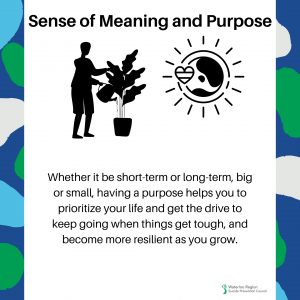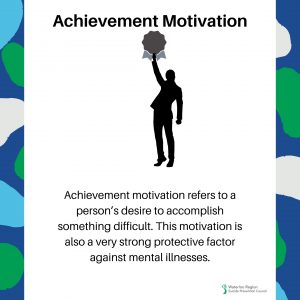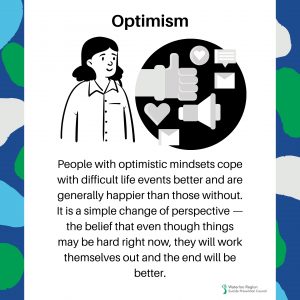Developed by Srishti Sharma, WRSPC Volunteer
The final form of protective factors in this series is Spiritual Protective Factors. Spirituality can be thought of as a connection to something outside yourself, as well as a connection within yourself, and can take the many forms such as introspection to understand yourself, your emotions, and your needs, or outer activities that help you feel connected to the earth or a larger purpose, or a sense of faith and belief in something grander than yourself. These factors include having a sense of meaning and purpose, achievement motivation and optimism.
1: Sense of Meaning & Purpose

Having a sense of purpose in your life can give you a sense of connection to something larger than yourself, such as a larger cause, goal, or passion. It gives you things to believe in and helps you live with values. Not only does it add meaning to your life, it also helps you to refocus and move ahead when things get hard. Whether it be short-term or long-term, big or small, having a purpose helps you to prioritize your life and get the drive to keep going when things get tough, and become more resilient as you grow (source).
2: Achievement Motivation

Achievement motivation refers to a person’s desire to accomplish something difficult. This motivation is also a very strong protective factor against mental illnesses. Having that internal push to keep going builds resilience and achieving that difficult task at the end gives a sense of accomplishment and reward that, once again, builds resilience (source).
3: Optimism

Both for mental and physical wellbeing, optimism significantly improves lifestyle and behaviour. An optimistic mindset focuses on the belief that the outcome will be positive. It is the belief that, in the end, everything will be alright. Due to this ideology, people with optimistic mindsets cope with difficult life events better and are generally happier than those without. It is a simple change of perspective — the belief that even though things may be hard right now, they will work themselves out and the end will be better. This ideology serves as a great protective factor and helps create a better mindset (source).
Local Community resources:
“Giving Back” is one of the Five Ways to Wellbeing developed by the Mental Wellness Network of Waterloo Region, and can help bring a sense of meaning, purpose, and spiritual connection. Their website contains information and suggestions on how to use this way to wellbeing.


